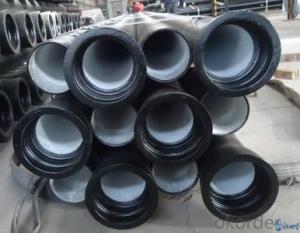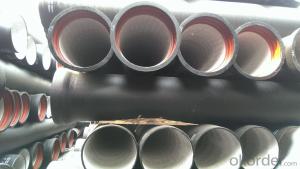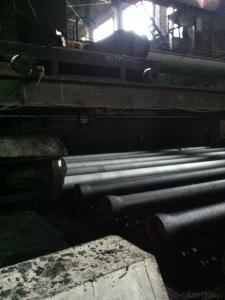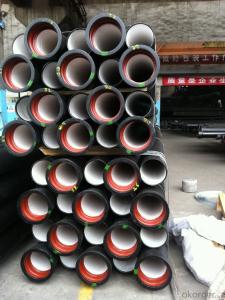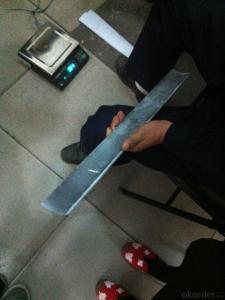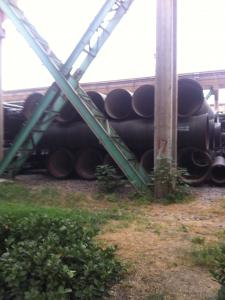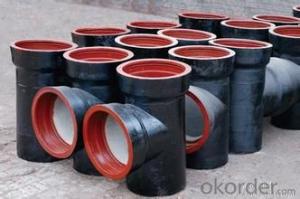DUCTILE IRON PIPE AND PIPE FITTINGS K9 CLASS DN125
- Loading Port:
- Tianjin
- Payment Terms:
- TT OR LC
- Min Order Qty:
- 20 pc
- Supply Capability:
- 3000 pc/month
OKorder Service Pledge
OKorder Financial Service
You Might Also Like
Material : Ductile Cast Iron
Size Range : DN 80mm to DN 2000mm
Unit Effective Length : 6m or 5.7m
Manufacture Standard: ISO 2531:1998/ EN 545:2006/EN 598:2007
Annual capacity : 200,000 tons
Coating Exterior: Zinc 130g/m2 according to ISO 8179-1 and bitumen coating 70 microns.
Cement Interior: Portland Cement/ High Alumina Cement/ Sulphate Resisting Cement Lining according to ISO 4179
Special requirements on external coating and internal lining can be applied
We also provide accessories such as SBR/EPDM rubber gaskets, lubricant paste, pipe caps, PE sleeves, etc.
Additional Parts:
Each pipe is strictly inspected according to related standard to ensure permanently high performance.
Easy Installation at site and service free for life
Long Service Lifespan
Quotation will arrive you within 24hours once we get your inquiry.
We guarantee offering you a competitive price.
A copy of original inspection reports of pipes will be offered after shipment.
Photos of loading process will be sent to the customer after shipment effect.
We will follow-up the delivery progress after shipment effect and update to the customer on weekly basis.
- Q: Are ductile iron pipes suitable for potable water distribution systems?
- Ductile iron pipes are well-suited for the distribution of drinking water in potable water systems. Ductile iron, a form of cast iron, is renowned for its strength and durability, making it an ideal choice for transporting drinking water. These pipes possess corrosion resistance, a crucial factor in preserving the safety and quality of potable water. Moreover, their smooth inner surface helps prevent the accumulation of sediments and biofilms that can negatively impact water quality. Furthermore, they can withstand high pressure and temperature fluctuations, rendering them suitable for diverse potable water distribution systems. In summary, ductile iron pipes are a dependable and widely employed solution for ensuring the provision of safe and uncontaminated drinking water to communities.
- Q: How are ductile iron pipes protected against root intrusion?
- Diverse techniques and methods exist to safeguard ductile iron pipes from root intrusion. The application of root inhibitors or growth regulators is a commonly employed approach. These substances are typically injected into the surrounding soil, forming a barrier that restricts root growth near the pipes. This effectively prevents roots from penetrating the pipes and causing damage. Another method involves the utilization of physical barriers like root barriers or sleeves. These barriers are installed around the pipes to physically obstruct root access. Root barriers are typically constructed from materials such as plastic or metal, engineered to withstand the pressure exerted by growing roots. In addition, regular maintenance practices like periodic inspections and cleaning play a crucial role in preventing root intrusion. By consistently monitoring pipe conditions and removing any existing root masses, the risk of further intrusion can be minimized. It is important to recognize that preventative measures are more effective than reactive measures in protecting ductile iron pipes from root intrusion. Therefore, implementing proactive strategies during the installation phase, such as proper pipe bedding and alignment, can significantly reduce the likelihood of intrusion. Overall, a combination of chemical treatments, physical barriers, and appropriate maintenance practices greatly enhances the protection of ductile iron pipes against root intrusion, ensuring their long-term durability and functionality.
- Q: How does ductile iron pipe perform in areas with high water hammer?
- Ductile iron pipe performs exceptionally well in areas with high water hammer. The strength and durability of ductile iron allow it to withstand the forceful impact of water hammer without any significant damage. Water hammer refers to the sudden increase in pressure caused by the rapid change in water flow direction or velocity, often occurring when valves are closed quickly. This abrupt change in pressure can lead to significant stress on pipes, potentially causing them to rupture or fail. However, ductile iron pipes have excellent impact resistance due to their unique composition and manufacturing process. They are made from a combination of iron, carbon, and small amounts of other elements such as silicon and magnesium. The graphite nodules formed during the manufacturing process give ductile iron its superior strength and flexibility, making it less prone to cracking or breaking under pressure. In areas with high water hammer, ductile iron pipe's inherent strength and resilience allow it to absorb and dissipate the force generated by water hammer events. Its ability to withstand the sudden pressure changes helps to prevent pipe failure, minimizing the risk of leaks or bursts. Additionally, the smooth internal surface of ductile iron pipes reduces the likelihood of water hammer occurrences by minimizing turbulence and maintaining a more constant flow. This characteristic helps to mitigate the impact of water hammer on the pipe system. Overall, ductile iron pipe is an ideal choice for areas with high water hammer due to its exceptional strength, impact resistance, and ability to withstand sudden pressure changes. Its performance in such conditions ensures the longevity and reliability of the water distribution system.
- Q: Can cast iron pipes not be used for domestic water supply and drainage?
- Yes, the main use is, outdoor water supply pipe can be PE or ductile iron (socket connection). Indoor water is now used in general plastic pipes, but in the past seems to be able to use ductile iron, as for drainage, generally do pressure type drainage, when the choice is cast iron pipe. There are also indoor fire pipes using welded steel tubes or ductile iron.
- Q: What is the difference between a cast iron pipe and a ductile iron pipe?
- Nodular cast iron has high strength and strong plasticity. The tensile strength of ductile iron is twice that of gray iron, and the yield strength even exceeds that of cast steel.
- Q: How do ductile iron pipes perform in high-velocity water flow conditions?
- Ductile iron pipes perform excellently in high-velocity water flow conditions. Their inherent strength and durability allow them to withstand the force and turbulence of fast-flowing water without any significant issues. These pipes have been extensively tested and proven to maintain structural integrity, resist erosion, and minimize the risk of leaks or bursts, making them a reliable choice for high-velocity water flow applications.
- Q: How does ductile iron pipe perform in areas with high soil compaction?
- Areas with high soil compaction benefit greatly from the exceptional performance of ductile iron pipe. One of its key advantages lies in its high strength and durability, enabling it to withstand heavy loads and pressures. In regions where soil compaction is prevalent, leading to ground movement and settling, ductile iron pipe's superior structural integrity guarantees its intactness and effective handling of stress. Moreover, ductile iron pipe exhibits excellent resistance to corrosion, which is especially crucial in areas with high soil compaction. The compacted soil often contains elevated levels of moisture or chemicals that may accelerate the corrosion process. Ductile iron's inherent resistance to corrosion ensures the pipe maintains its integrity over time, even in challenging soil conditions. Flexibility is another advantage of ductile iron pipe. This material possesses a high degree of flexibility, enabling it to absorb and distribute external loads more efficiently. In areas with high soil compaction, where the ground may shift or settle, ductile iron's flexibility minimizes the risk of pipe failure or damage. Additionally, ductile iron pipe boasts a smooth interior surface, enhancing its hydraulic performance. In regions with high soil compaction, where space for proper compaction around the pipe may be limited, the smooth interior reduces the likelihood of sediment buildup or clogging, ensuring efficient water flow. Overall, ductile iron pipe proves to be an excellent solution for areas with high soil compaction. Its strength, corrosion resistance, flexibility, and hydraulic performance establish it as a reliable and durable choice capable of withstanding the challenges presented by compacted soils.
- Q: Can ductile iron pipe be recycled?
- Yes, ductile iron pipe can be recycled. Ductile iron is a type of iron that is commonly used in the manufacturing of pipes due to its high strength and durability. When a ductile iron pipe reaches the end of its useful life, it can be recycled by melting it down and using the molten iron to create new products. Recycling ductile iron pipe not only helps conserve natural resources but also reduces the need for raw materials and energy-intensive processes involved in manufacturing new pipes. Additionally, recycling ductile iron pipe helps minimize waste and contributes to a more sustainable and environmentally friendly approach to infrastructure development.
- Q: What are the different types of valves available for ductile iron pipe?
- Ductile iron pipe offers a variety of valve options, each with its own unique purpose and function. Among the most commonly used valves are: 1. Gate Valves: These valves are designed to either fully open or fully close the fluid flow in the pipe. They feature a gate-like mechanism that permits or blocks the passage of fluid depending on the valve's position. 2. Butterfly Valves: Butterfly valves are quarter-turn valves that utilize a circular disc to control the flow. When open, the disc aligns parallel to the flow, resulting in minimal pressure drop. Conversely, when closed, the disc aligns perpendicular to the flow, effectively stopping the fluid. 3. Ball Valves: Ball valves consist of a spherical disc with a central hole, known as a ball. When the valve is open, the ball is positioned to allow fluid to pass through the hole. To close the valve, the ball is rotated to obstruct the flow. 4. Check Valves: Check valves are specifically designed to permit fluid flow in one direction only, preventing backflow. They incorporate a flap or disc that opens when the flow is in the correct direction and closes to halt the flow when reversal occurs. 5. Plug Valves: Plug valves feature a cylindrical or conical plug with a through-hole that can be rotated to regulate the flow. When open, the hole aligns with the pipe, enabling fluid to pass. Closing the valve positions the hole perpendicular to the pipe, blocking the flow. 6. Pressure Reducing Valves: These valves serve the purpose of controlling and reducing the pressure of fluid within the pipe. They employ a mechanism that adjusts the flow area to achieve pressure reduction. 7. Pressure Sustaining Valves: Pressure sustaining valves are utilized to maintain a specific pressure level within the pipe. They automatically adjust the flow area to sustain the desired pressure. 8. Air Release Valves: Air release valves are employed to eliminate trapped air within the pipe. They allow air to escape while preventing fluid leakage. These examples demonstrate the diverse range of valve options available for ductile iron pipe. The selection of a suitable valve depends on factors such as the application, flow requirements, and desired functionality.
- Q: What is the expected hydraulic performance of ductile iron pipes?
- The expected hydraulic performance of ductile iron pipes is generally excellent due to their smooth internal surface, which minimizes friction and pressure drop, allowing for efficient flow of water or other fluids. Additionally, their high strength and durability ensure long-term reliability and minimal leakage, making ductile iron pipes a preferred choice for water supply and drainage systems.
Send your message to us
DUCTILE IRON PIPE AND PIPE FITTINGS K9 CLASS DN125
- Loading Port:
- Tianjin
- Payment Terms:
- TT OR LC
- Min Order Qty:
- 20 pc
- Supply Capability:
- 3000 pc/month
OKorder Service Pledge
OKorder Financial Service
Similar products
Hot products
Hot Searches
Related keywords
